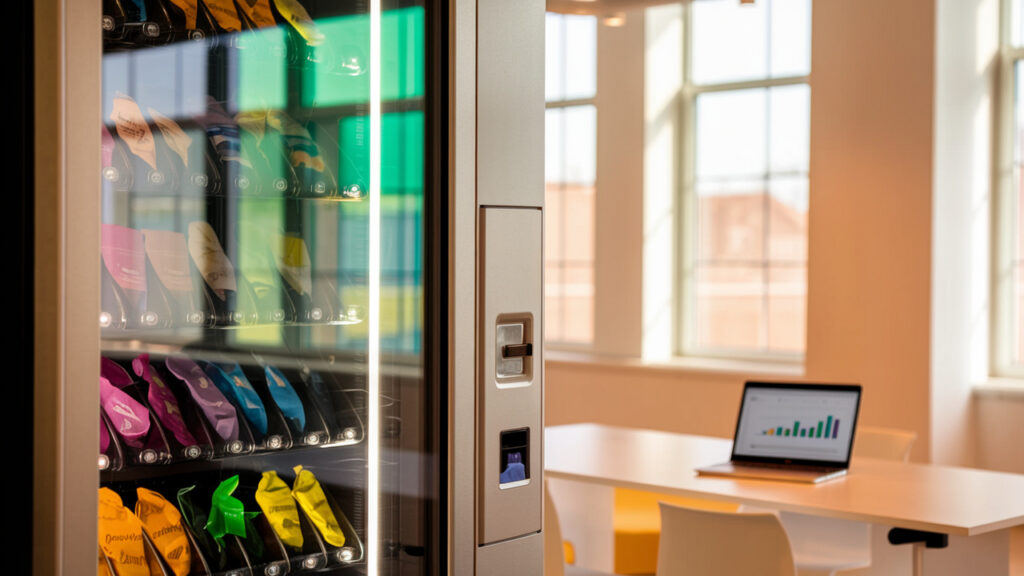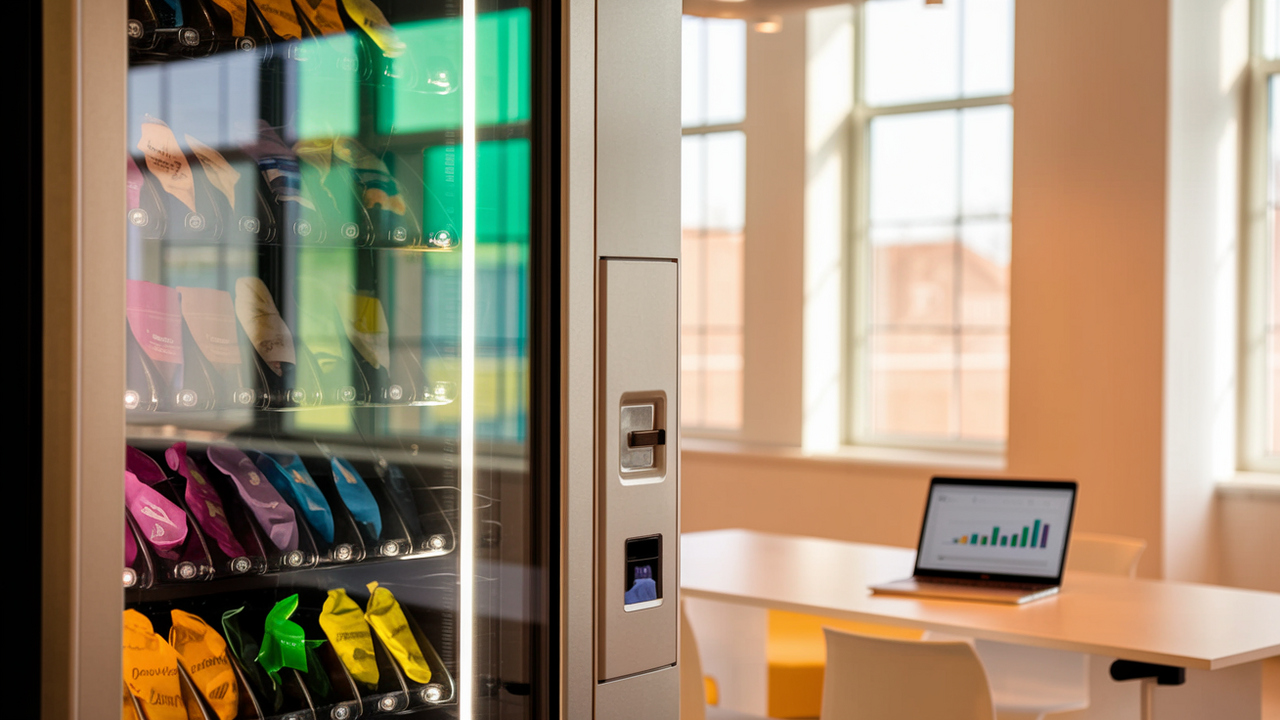Where to Find Financing Options for Buying a Vending Machine
Getting into the vending machine business is one of the smartest ways to start earning passive income, but there’s one obstacle many people face upfront: the cost. A quality vending machine can cost anywhere from $2,000 to $6,000 or more, depending on the size, type, and payment system. That’s where financing comes in.
In this post, I’ll break down exactly where to find vending machine financing, what types of options are available, who qualifies, and what to watch out for before signing any loan or lease agreement.

Table of Contents
Featured Snippet
Can you finance a vending machine?
Yes. You can finance a vending machine through equipment financing companies, vending machine suppliers, online lenders, or business credit cards. Many lenders offer low monthly payments with flexible terms, especially for business owners with good credit or an EIN.
1. Equipment Financing Companies
Equipment financing is one of the most common ways to buy a vending machine without paying the full cost upfront. These lenders specialize in funding physical assets like vending units, ice machines, ATMs, or coffee equipment.
Top providers:
- Crest Capital – No blanket liens, great for businesses with 2+ years history
- Taycor Financial – Flexible terms, good for startup vending businesses
- TimePayment – Known for working with applicants who have lower credit scores
Most of these lenders will finance new or used machines, and the equipment itself acts as collateral.
2. Vending Machine Suppliers with Built-In Financing
Some of the best-known vending suppliers offer direct financing programs, which means you can apply for a machine and a payment plan at the same time.
Examples:
- Vending.com – Offers in-house financing and lease-to-own
- HealthyYOU Vending – Franchise-style model with financing built in
- CandyMachines.com – Financing on bulk machines through third-party providers
These programs often bundle shipping, warranties, and customer support — making them ideal for new operators.
3. Online Lenders and Fintech Platforms
Many small business owners turn to online lenders that provide fast approvals, low paperwork, and flexible repayment terms.
Trusted options:
- Lendio – Matches you with financing offers from multiple lenders
- BlueVine – Known for working with newer businesses
- Fundbox – Offers lines of credit you can use to buy vending equipment
- Credibly – Works with lower credit scores (500+) and same-day funding
These lenders often offer short-term loans, lines of credit, or equipment-specific loans.
4. Business Credit Cards
If your vending machine costs less than $5,000 and you qualify for a solid business card, this is a good option — especially if it has 0% APR for the first 12–18 months.
Good picks:
- Chase Ink Business Cash
- American Express Blue Business Plus
- Capital One Spark Classic (for fair credit)
Just be sure to pay it down before the promotional period ends, or you’ll face high interest rates.
5. Local Banks and Credit Unions
If you already have a business bank account, ask your local bank or credit union about small business equipment loans. These often come with:
- Fixed interest rates
- Low origination fees
- Better customer service than national lenders
Some banks also offer SBA Microloans, which can be used for vending machines, especially if your business is new or located in an underserved area.
6. Buy Now, Pay Later (BNPL) Options
Some suppliers and Amazon sellers offer BNPL tools like Affirm, Klarna, or PayPal Pay Later. While not technically business loans, they allow you to split payments over 6, 12, or 24 months with low to no interest — depending on your credit.
Use this option with caution, since late payments can hurt your credit score or lead to high fees.
What You’ll Need to Qualify
Here’s what most lenders will ask for:
- Valid U.S. ID
- Social Security number (or EIN for business credit)
- Proof of income or bank statements
- A minimum credit score (typically 600+, but some accept lower)
Having a business plan, website, or LLC setup also increases your approval odds.
Final Thoughts
Starting a vending business doesn’t have to be expensive upfront. With the right financing option, you can get the machine you need — and start earning — without draining your savings.
Whether you go with equipment financing, a business credit card, or direct financing from a vending supplier, make sure the terms align with your cash flow and long-term goals. And if you plan to scale, look for lenders that allow repeat financing for multiple machines.
If you’re just starting out, many lenders will ask whether you plan to operate as a sole proprietor or LLC. Having an LLC or registered business can open up more financing options, including access to business-only lenders who don’t require a personal guarantee.
One often-overlooked option is to finance through a vending route seller. Some entrepreneurs who sell their machines and locations as a package will offer owner financing, meaning you make monthly payments directly to them instead of going through a bank. Just be sure to get all terms in writing.
If you’re building a multi-machine operation, you may qualify for bulk financing or equipment leasing programs. These programs allow you to finance 3–10 machines under one agreement, which can simplify paperwork and lower your monthly payments.
When comparing financing offers, look beyond just the interest rate. You’ll want to check for origination fees, prepayment penalties, and whether the loan is secured by the machine (equipment-secured) or unsecured (based only on credit).
If your credit score is under 600, consider applying with a co-signer or guarantor. A family member or business partner with better credit can significantly improve your odds of approval and help you access lower interest rates or better repayment terms.
Some lenders also offer deferred payment plans, meaning you don’t start paying until 30–90 days after funding. This is ideal if you want to get your machine up, placed, and producing revenue before your first payment is due.
A growing trend in vending financing is the use of merchant cash advances. These are based on your projected or historical revenue and can be repaid automatically from your card sales. While fast, they often come with higher fees and shorter terms, so use them cautiously.
If you’re a veteran, woman, or minority business owner, check with organizations like Accion, Kiva, or local SBA microloan partners. Many offer funding programs specifically designed to help underrepresented entrepreneurs get started with small business equipment.
One important thing to remember: always ask your lender if they report to business credit bureaus. Financing your vending machine through a lender that reports can help you build business credit, making it easier to secure larger loans in the future.
Some vending machine suppliers offer lease-to-own options, where you pay monthly and own the machine after a set term (usually 24–60 months). This is a great way to preserve working capital while still building equity in your machine.
It’s also a good idea to run profit projections before taking on debt. Calculate how many sales you’ll need per week to cover your monthly payment, and choose a machine/location where that target is realistic. This reduces your financial risk and helps you stay cash-flow positive.
Finally, don’t forget to factor in ongoing costs like inventory, maintenance, restocking trips, and payment processor fees. The machine is just the first investment — and your financing plan should support sustainable long-term growth, not just acquisition.

